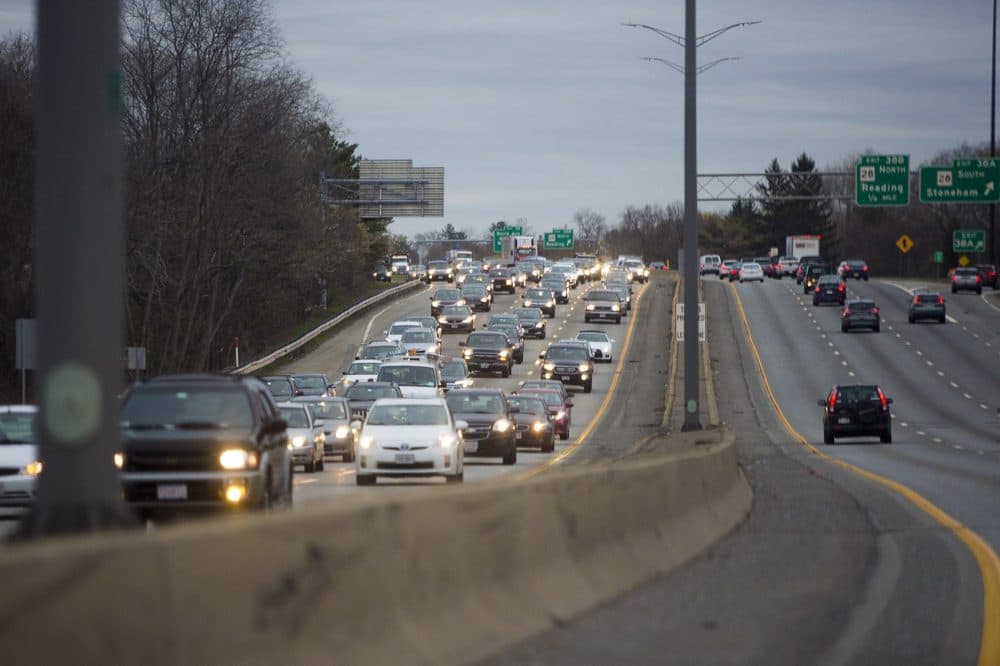Advertisement
Mass. Lawmakers Urged To Try Congestion Pricing To Ease Traffic

Citing the Baker administration's warning that traffic is at a "tipping point," lawmakers and advocates renewed calls Tuesday for Massachusetts to follow its peers and adjust roadway tolls at different times of day in an attempt to reduce congestion.
A version of the system, referred to as congestion pricing, is already in place in nine of the country's 10 largest metropolitan areas, according to Transportation for Massachusetts Executive Director Chris Dempsey.
The only city on that list without any form of congestion pricing, he said, is Boston, which one study deemed as having the worst and costliest traffic in the nation.
"Traffic is not unique to Massachusetts, but we have largely been throwing up our hands in frustration or even adopting policies that make things worse," Dempsey said. "Other regions around the country are tackling this problem head-on by providing pricing incentives for where and when people drive."
Several bills before the Transportation Committee would create congestion pricing in Massachusetts. Two proposals range in specificity and duration: one calls for a pilot program in the Sumner, Callahan and Ted Williams tunnels, and the other would enact full statewide implementation.
Both systems would call for roadway tolls to decrease at least 25% during off-peak times, and the larger-scale version would impose a premium cost of at least 25% during peak travel.
The bills do not define peak and off-peak periods, and peak traffic periods have been lengthening.
Roadways within the Route 128 belt, for example, now see a 14-hour "peak period" stretching across the day, a study of congestion released in August by the Baker administration. By 6 a.m. on a typical weekday, one in four miles of road inside Route 128 are either congested, which means travel times are 50% higher than a full-speed trip, or highly congested, where cars move at least twice as slow. The afternoon rush in that region starts as early as 3 p.m. and lasts until well after 6 p.m.
The goal of the pricing bills is to incentivize drivers to travel at less-crowded times of day or to encourage greater use of public transit, both of which would reduce the all-too-familiar strain of clogged roadways.
"Roadway congestion is a threat to our economy, our quality of life, and our climate change goals," said Tom Ryan, director of public policy and government affairs for the group A Better City.
And because traffic scales up very quickly — once roads are at maximum capacity, every additional car creates more traffic than the one before it — supporters say the goal is within easy reach: a 5% reduction in total vehicles in use at peak time would reduce traffic 20%, according to Sen. Joseph Boncore, who filed the Senate bills and co-chairs the Transportation Committee.
"There's a lot of broad-based support," Boncore said. "When we talk about congestion, the number one policy recommendation of any expert in the field is congestion pricing, all across the country. We've seen it work in other states and other cities. If we're going to have a really serious conversation about doing something, it needs to be part of the solution."
In an October 2008 report, the Federal Highway Administration wrote that "there is a consensus among economists that congestion pricing represents the single most viable and sustainable approach to reducing traffic congestion," as Dempsey cited in his Tuesday testimony.
However, Gov. Charlie Baker has previously opposed the idea of congestion pricing, arguing that increasing the price to drive at peak times will have an undue impact on commuters who are not able to change their schedules.
He vetoed legislation last year that would have piloted a program, instead ordering a study of traffic that concluded the problem is causing economic and environmental impacts. This summer, as he unveiled the study's results, Baker instead supported the development of "managed lanes," which drivers could pay to use and travel faster.
Baker is not alone in raising concerns over equity: Rep. Lindsay Sabadosa, a Northampton Democrat, pressed Dempsey on how congestion pricing would affect residents in western Massachusetts who have no rail options and few bus options to reach Boston.
"I don't understand how congestion pricing works when there's no way for us west of Worcester to get into this part of the state without driving," Sabadosa asked. "I keep trying to wrap my head around: is this the right solution for eastern Massachusetts but not western Mass?"
Supporters said other regions have taken several steps to avoid uneven impacts, including offering tax incentives for low-income drivers or using revenue generated to increase low-cost public transit.
"Fairness and equity are something we're talking about and it's often brought up, but I think what's unfair is that people who have to be at work at certain hours are sitting in traffic," Boncore said. "That is unfair, and that's something we can begin to do something about."